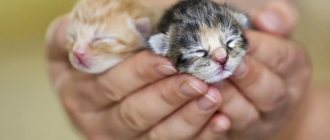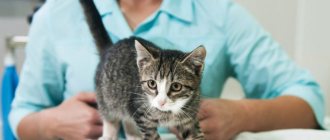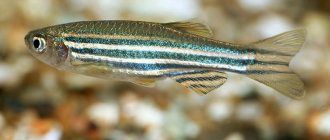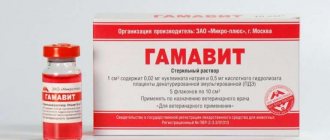“Activated carbon” is a well-known sorbent that is used for various poisonings. Has a powerful adsorbing effect. The active component of the drug quickly envelops the gastric mucosa, which prevents harmful substances - heavy metal salts, narcotic components, poisons, chemicals, toxins - from entering the bloodstream. The medicine is safe, it is removed from the body unchanged in feces after 7-10 hours, turning it black. The sorbent is prescribed to everyone without exception, including infants and the elderly. Is it possible to give Activated Carbon to a cat?
"Activated carbon" for cats: application
How to give a cat a pill
Any pet will resist when a pill is forcefully given to it. This is completely natural behavior. Therefore, certain knowledge and skills are required. We will analyze in detail how to give the medicine correctly so that your pet does not scratch you or cause harm to itself.
- The whole tablet. With his left hand he pulls the skin towards the withers, while raising his head. The mouth will open on its own. Closer to the root of the tongue, cats have no teeth, so that’s where we put the product. We close and fix the mouth until he swallows it.
- Diluted in water. Initially, you need to crush the tablet into powder and dilute it in 3-5 ml. boiled cooled water. We draw the prepared solution into a syringe. We take the pet in our arms and sit it on our knees. With our left hand we hold the pet’s head and at the same time pull the edge of the mouth towards the back of the head with our fingers. With your right hand, insert the syringe into the oral cavity into the free space between the gums (they have no teeth at the edges of the gums) and pour in the prepared product. We hold the pet in this position until he swallows the medicine.
- Enema. This option is suitable if more than 2 hours have passed since the poisoning and the pet has a gag reflex, since the toxic substances have already penetrated the intestines. Grind the tablet and dissolve in 100 ml of water. We collect the resulting solution into a children's rubber enema. We lay the household member on his side. We treat the tip of the syringe with Vaseline and insert it in a spiral motion into the opening of the anus: 2 cm for an adult, 1 cm for a kitten. Introduce the suspension slowly so as not to damage the rectum. Afterwards we hold the animal for 15 minutes. To carry out the act of defecation, we place it in a wide tray.
Adverse reactions
Rarely, pets may develop constipation in response to drug therapy.
Mostly activated carbon and Polysorb are well tolerated by the cat’s body and do not cause side effects. However, some pets experience a deterioration in the absorption of hormones, vitamins, microelements and other beneficial components. It is possible that prolonged constipation may occur, as a result of which breakthrough diarrhea or hemorrhoids often develop. Activated carbon can also affect the activity of gastric juice, reducing it. The safest side effect is considered to be a change in the color of stool to black.
Dose of activated carbon
The required dose is calculated based on the weight of the adult pet. The recommended dose per 10 kg of weight is 0.25 g. main active ingredient, that is, 1 tablet. The drug should be used every 4 hours up to 4 times a day.
The medication should not be given for more than 7 days, regardless of the pet’s age.
Dosage
Rules for taking the drug
Veterinarians are confident that charcoal does not cause harm to pets and practically does not cause any negative reactions, so animals should take it. If it is not possible to contact a veterinarian at first, the owner must provide first aid to the pet.
Admission rules:
- First you need to move the animal to fresh air or open a window to allow air to enter.
- Then try to determine what caused the poisoning. If poison gets on the animal's fur, it should be washed off with cool water and soap.
- Then give the cat a sorbent.
- In order for the drug to be better absorbed, it must be crushed, diluted with a small amount of water, then stirred and given to the cat.
- It is better to introduce it into the mouth using a spoon or syringe, removing the needle from it.
- If you have an appetite, activated charcoal can be mixed with food given to your pet.
If your pet refuses to swallow the drug, you should take a blanket and wrap the animal so that it does not break out or scratch it with its claws. First you need to wrap the neck, then the paws. Then the entire body is twisted, leaving only the protruding muzzle. After this, the cat’s mouth is opened and the sorbent is introduced. If the cat is unconscious, you should not try to give medication; you must call a veterinarian.
During poisoning, the pet needs drinking water, because... it, together with charcoal, will promote the rapid elimination of toxic substances, reduce the load on the kidneys and liver, and prevent the process of dehydration of the cat’s body.
Some veterinarians believe that this drug can be used in pets and as a preventative measure, in order to avoid digestive disorders in the gastrointestinal tract, if the cat does not live at home, but on the street or often walks there. To do this, the absorbent is crushed and poured into the pet's food.
An animal that has received food poisoning must be under the supervision of the owner; if the condition is bad, it is forbidden to give food or influence the process of diarrhea and vomiting, because it is a natural way of eliminating toxins.
If vomiting and diarrhea more than 7-8 times a day, then you should be wary and seek help from a specialist.
It should be borne in mind that the use of charcoal for diarrhea will only act on the elimination of poisons; the drug will not have an effect on the process of peristalsis and the speed of the digestion process. The medication is perfect for treating mild poisoning; for severe problems, it alone will not be enough. In the first stages of poisoning, combining the drug with Smecta or Atoxil is allowed.
Contraindications and side effects
The main contraindications for use are:
- peptic ulcer;
- stomach and intestinal bleeding;
- intolerance to the components of the medication;
- diabetes;
- allergy to starch.
With prolonged use of the medicine, undesirable consequences may develop. These include:
- constipation;
- adsorbs a large amount of vitamin, which leads to vitamin deficiency in the animal;
- leads to a decrease in the acidity of gastric juice.
Activated carbon
Benefits and harms
The drug will help an animal that has eaten something wrong.
The advantage of using this medication lies in the fact that its systematic use helps prevent the occurrence of food poisoning. In addition, the medicine is also effective for cats in cases where metabolic disorders have already occurred. The benefits of activated carbon lie in the removal of heavy metal salts and relief from bloating after eating a large amount of food. However, the medication can also cause harm to the body. If given to cats over a long period, bowel problems may develop. In addition, long-term use of pharmaceuticals sometimes causes leaching of useful substances from the body.
Prevention of poisoning in cats
For preventive purposes, the medicine is prescribed 1 tablet per day, by mixing it with food. Before adding it, it must be crushed into powder and mixed into food in small portions throughout the day, so that the pet does not sense the presence of the medicine.
Also, for the purpose of prevention, certain points that can provoke poisoning should be observed:
- It is not recommended to grow poisonous plants at home;
- medicines and household chemicals should be kept out of the reach of your pet;
- do not leave food that is not intended for animal consumption unattended;
- close the trash can tightly;
- carry out preventive measures against fleas and ticks in a timely manner, but only with products for cats and taking into account weight (replacing the medicine with an analogue for dogs can provoke poisoning).
To summarize, we can say that activated charcoal can be given to a cat at the first symptoms of poisoning. However, if there is no improvement within 24 hours or if the pet becomes worse after taking it, then you should contact a veterinary clinic to prescribe effective treatment.
When does a cat need activated charcoal?
The drug is obtained from charcoal powder; starch and sucrose are added to form tablets.
It absorbs toxic substances from the gastrointestinal tract, does not break down, and is not absorbed into the blood. After a day, it is completely excreted along with feces. Doctors prescribe charcoal in the following cases:
- poisoning with food, drugs, chemicals;
- food infections: salmonellosis, dysentery;
- stomach diseases, which are accompanied by flatulence and bloating;
- renal failure;
- diarrhea after deworming;
- allergies to food, medications.
Without a doctor's prescription, the drug is given at the first signs of poisoning:
- nausea, vomiting and diarrhea;
- weakness;
- increased salivation;
- dilated pupils;
- labored breathing;
- fever;
- impaired coordination of movements.
The drug will be needed when at least two symptoms appear: the sooner it gets into the gastrointestinal tract, the faster the spread of toxins throughout the body will stop. For prevention, charcoal is given when it is suspected that the cat has swallowed stale food or licked a toxic substance. The drug can be used for pregnant and lactating cats.
Pharmaceutical analogues
Activated carbon has effective analogues:
- "Smecta". A harmless drug with zero risk of complications. Quickly relieves irritable bowel symptoms. Diluted in water in a ratio of 1:2 tsp. and is consumed 2 times a day.
- "Polysorb". The main substance is silicon dioxide, which is much more effective than activated carbon. Reduces symptoms of poisoning within 10 minutes. The suspension should be dissolved in 30 ml of water at a rate of 1 mg/1 kg of body weight and consumed 5 times a day.
- "Enterosgel". Has contraindications. To alleviate the condition, one application is enough: 1 tsp. 2 times a day 3 hours before meals.
- "Polyphepan". Consists of hydrolytic lingin, activated carbon. Take 1 tsp three times a day. 30 minutes before meals.
Important! Before using these products, read the instructions and possible contraindications.
The use of activated carbon plays an important role in rescuing a poisoned animal. Animal owners should be aware of the indications, method of use and possible consequences observed when taking the drug. Before using a medicine, it is important to evaluate the benefits and risks.
Can diarrhea be treated with charcoal?
Activated carbon binds and evacuates toxins. This is useful for some diseases:
- in case of bacterial infections, fermented products are evacuated (which causes flatulence);
- in case of helminthic infestations, it is useful to remove accumulated mucus and those toxins that the worms secrete;
- but charcoal is most useful for food poisoning.
Please note that in most cases (except for intoxication), activated charcoal does not eliminate the cause of diarrhea, so the drug can only be used as symptomatic therapy.
To eliminate diarrhea itself and its causes, it is necessary to take other means.
In what cases is coal used?
Activated carbon for cats is used for various poisonings. Veterinarians recommend using the product in the following pathologies:
- diseases of the stomach and intestines, accompanied by increased gas formation;
- intoxication with spoiled foods, chemicals and medications;
- infectious diseases affecting the digestive tract, incl. dysentery - of course, in this case the sorbent is used together with antibiotics;
- renal failure;
- allergic reactions after consuming certain foods and medications.
Some pet owners use the medicine for preventive purposes, for example, after a deworming procedure. Often, after treatment for worms, a cat develops diarrhea: due to the death of helminths, intoxication occurs when dead parasites and their eggs decompose in the cat’s gastrointestinal tract. Regular activated carbon will help eliminate the consequences of decay products entering the bloodstream.
It must be remembered that the drug is used only for mild forms of poisoning . If the intoxication of the animal is associated with severe viral or bacterial infections, or the ingestion of serious poisons into the body, the sorbent is useless. In such cases, urgent assistance from a veterinarian will be required.
Purpose and effect of the drug
Often more properties are attributed to this medicine than it actually is. To determine what is a myth and what is true, situations in which activated carbon has different effects are discussed below.
In case of poisoning
What to give your cat for diarrhea at home
Activated carbon provides emergency treatment for acute poisoning after taking a large amount of a toxin or drug. Effectiveness depends on the time elapsed since ingestion, the type of toxin, and its ability to bind to activated charcoal.
Important! Activated charcoal should be given as soon as possible after ingesting the poison. Used within 1 hour of poisoning, it can reduce the absorption of toxins by up to 75%.
Can diarrhea be treated with charcoal?
Charcoal is more effective in preventing toxicity in the body, but it is considered useless against diarrhea. For diarrhea in animals, it is necessary to use other medications.
It is necessary to give the cat the opportunity to get acquainted with the medicine
Prevention remedy
Activated charcoal is rarely used for preventive purposes, as most owners monitor their pets and what they eat. But if the animal finds itself in a new place without constant control by the owner, then this adsorbent is perfect as a preventative against poisoning or if it is predisposed to allergies.
Treatment of poisoning
Treatment for poisoning includes:
- Stopping the effect of poison on the body.
- Removing a toxic substance from the body: washing the stomach and intestines by prescribing emetics, laxatives, adsorbents, and diuretics.
- Neutralization of poison (use of antidote, antidote).
- Symptomatic treatment depending on the symptoms accompanying poisoning.
It is not difficult to guess that the cat owner can independently do only two points out of the available four. Measures must be taken as soon as possible after the poison enters the body.
- Gastric lavage can be done with a large amount of water with the addition of table salt or baking soda.
- It would be a good idea to do an enema, in this case there is a chance to remove toxins from the body several times faster than with a simple gastric lavage.
- Apomorphine or potassium permanganate diluted in water is used as an emetic. It is advisable to always have these tools.
Activated carbon has always been the best adsorbent.
In case of poisoning, a good result is obtained by using mucous decoctions or coating substances (egg white, rice water, tannin solution, etc.). They cover the gastric mucosa and prevent poisons from being absorbed.
After all these measures, the cat must be taken to a veterinarian, where you can tell in detail about all the signs that have been observed over the past hours, and also suggest, and maybe say affirmatively, what exactly the cat was poisoned with
It is important not to withhold information; the pet’s health will depend on its completeness. The doctor should also take samples of vomit and feces, if any.
KotoDigest
“Activated carbon” is a well-known sorbent that is used for various poisonings. Has a powerful adsorbing effect. The active component of the drug quickly envelops the gastric mucosa, which prevents harmful substances - heavy metal salts, narcotic components, poisons, chemicals, toxins - from entering the bloodstream.
"Activated carbon" for cats: application
Having decided to get a cat, the owner must understand that feeding, cleaning the animal’s litter box and combing it regularly is only half the battle.
If you have a four-legged friend in the house, it is very important to ensure his complete safety. This is especially true for small kittens, who strive to taste something.
And this is not necessarily due to the fact that the owner does not feed his pet enough. Most likely, teething or a weakened sense of smell is to blame. Therefore, food that is not at all intended for a weak and fragile body often ends up in the stomach of little fidgets. Hence, gastric and intestinal disorders in the form of diarrhea, vomiting and other signs of intoxication.
How can you tell if an animal is poisoned? Here are the main symptoms:
- loose, watery stools, the frequency of which can be from 5 times per day;
- rapid breathing;
- refusal of food;
- dark urine, frequent urination;
- dry nose, dilated pupils;
- a radical change in behavior (an active cat becomes too calm, immobilized, sleeps all the time);
- putrid odor from the animal’s mouth, glow in the dark vomit (observed in case of phosphorus poisoning);
- heavy breathing, production of large amounts of saliva, swelling of the tongue and gums (acid poisoning);
- decreased temperature, ulcerations on the oral mucosa, paralysis, uremia (mercury poisoning);
- regurgitation, vomiting; in severe cases, convulsions, trembling, loss of consciousness, and paleness of the mucous membranes of the mouth are observed (this indicates the onset of dehydration).
If one of these signs is present, you need to sound the alarm. The best option is to contact a veterinarian. If this is not possible, then you urgently need to give your pet “Activated Carbon”. The drug is absolutely harmless to four-legged animals, so veterinarians recommend giving it in case of poisoning - and the sooner the better.
The main symptoms of poisoning are:
- vomiting and diarrhea;
- copious amounts of saliva;
- lethargy;
- disorientation in space;
- dilated pupils;
- hard breath.
If at least two symptoms are present, owners should already be wary of possible pet poisoning. In this case, you must contact your veterinarian and take your pet to him for examination. If this cannot be done, you can give activated charcoal to the cat; it will not be unnecessary, but will only be beneficial.
When the remedy is needed
The product is used to combat toxins. This is necessary in the following cases:
- When bacteria penetrate the animal’s body, the drug removes fermentation products from the gastrointestinal tract that cause bloating.
- When infected with worms, charcoal removes mucus elements and toxic substances produced by worms.
- For food poisoning, tablets are indispensable because they will quickly rid the body of harmful substances.
But the remedy does not remove the cause of diarrhea. This suggests that it is only suitable for symptomatic treatment.
Features of the treatment of small kittens
When an animal has diarrhea, charcoal does not distinguish between harmful and beneficial substances. If the kitten is given any other medications, then charcoal may reduce their effectiveness, so it is better to give it to your pet an hour after taking the other medications.
The drug has a positive effect on the intestines, so it is allowed to be used even when the pet is severely weakened.
Coal will eliminate symptoms of intoxication in case of mild food poisoning or during a diet change.
Overdose
Side effects from activated carbon are rare; symptoms of overdose correspond to severe constipation. Since the drug, as mentioned above, absorbs a large amount of liquid and mucus.
Symptoms:
- the animal tries to go to the toilet, strains, but feces do not come out;
- severe dehydration; if you lift a cat by the withers, it then does not straighten out for some time;
- dry, cracked stool;
- stomach ache;
- a lump is felt in the abdomen.
a large amount of water along with the charcoal . Enveloping drugs and agents that enhance intestinal motility will help the dense lump come out (the latter may not be given in case of diarrhea).
Charcoal for diarrhea
Approximately 25% of pet owners' visits to veterinarians related to poisoning result in the prescription of activated charcoal. Therefore, cat owners must be able to distinguish one type of poisoning from another and know in what cases it is appropriate to give this remedy to the animal, and what it can be combined with.
Due to the fact that the drug acts as a cure only for the symptoms of diarrhea, it does not eliminate the real causes of the problem.
What kind of poisoning can there be?
Poisoning by its nature can have different origins:
- feed - the intake of poisons through the mouth with feed that contains some kind of toxic substance;
- vegetable – the effect of plant poisons;
- medicinal – overdose of drugs, use of drugs to which the cat has an individual intolerance, pills that cause allergies, etc.;
- poisoning by poisonous gases - this can be carbon monoxide, chlorine vapor and other toxic fumes;
- Poisoning with household chemicals is a fairly rare phenomenon, but it also happens.
READ Detailed instructions for using the drug Vitafel-s for cats
If we are talking about cats, feed poisoning is most often encountered in veterinary practice.
Based on the principle of its effect on the body, poisoning can be divided into:
- local, when the violation is limited to the point of contact;
- general, which is manifested by damage to individual organs and systems.
There are acute and chronic poisoning of cats:
- Acute occurs as a result of large doses of a toxic substance entering the body. It is accompanied by a violation of important functions, which can often result in the death of the pet.
- Chronic poisoning is the result of prolonged exposure to a toxic substance on the body in small doses. There is an accumulation of poison, which leads to exhaustion of the pet, decreased immunity and weakened overall health.
If there is a pet in the house, especially a small one, then every owner should understand that his pet is not immune from various unpleasant incidents, in particular from poisoning. Cats are very inquisitive but cautious animals. They can rarely get poisoned by accident, since their sense of smell is very developed.
But a kitten is more likely to face such force majeure, since babies have either a completely absent or weakened sense of smell. Sometimes they like to feast on some food that is not at all intended for a weak stomach; the result of this curiosity can be food poisoning and indigestion with diarrhea.
Many owners are confident that if the cat does not leave the confines of the home, then it is not in danger of poisoning. This is a typical misconception. According to statistics cited by veterinarians, 10% of all cases of visits to animal clinics are due to poisoning. The reason for this may be the natural curiosity and hunting instinct of cats (they love to try new substances and plants), spoiled food, expired food, or even their habit of constantly licking their fur (it is on the fluffy “coat” that dangerous substances can get in - poorly washed flea shampoo, chemicals).
The owner of the animal should be aware of the symptoms that will help determine that his pet has poisoning:
- rapid breathing;
- diarrhea;
- manifestation of allergic reactions;
- behavior change;
- refusal to eat;
- heavy salivation;
- trembling throughout the body;
- violation of movement coordination;
- dilated pupils;
- convulsions;
- loss of consciousness.
The surest and safest way to help a cat with poisoning is to immediately contact a veterinarian. However, this possibility is not always available. If the owner understands that the animal has been poisoned, he can give it activated carbon, which is available in the first aid kit of everyone without exception.











